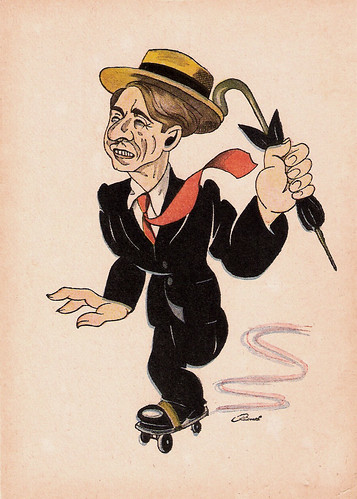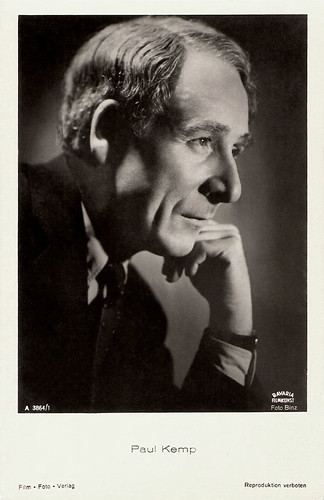
German postcard by Ross Verlag, no. A 3146/1, 1941-1944. Photo: Ufa.

German collector card by Ross Verlag in the series 'Vom Werden deutscher Filmkunst - Der Tonfilm', album no. 11, picture no. 47. Photo: Froelich-Film. Ida Wüst and Paul Kemp in Mieter Schulze gegen alle/Tenant Schulze against everyone (Carl Froelich, 1932).

German postcard by Ross Verlag, no. 7982/1, 1932-1933. Photo: Ufa.
Cinema pianist
Paul Peter Kemp was born in Bad Godesberg, Germany in 1896 (some sources say 1899). He was the son of a music teacher. Paul wanted to become an architect and studied at the Baugewerkschule in Cologne. His first job was as a pianist who accompanied silent films in a cinema.
When the First World War broke out, he volunteered and served as an ambulance driver on the Western Front. During the war, he has his first theatre experiences with an army stage company.
After the war, he decided to become an actor. He studied at the Hochschule für Bühnenkunst of the Schauspielhaus in Düsseldorf and made in this city his debut as a comedian. Other engagements in Hamburg and Berlin followed.
He had his breakthrough with his performance in Vicki Baum's hit play 'Menschen im Hotel' (1930) under the direction of Gustaf Gründgens. Critics rated him as a first-class character comedian. That year he also entered the cinema.
His film debut was in the drama Cyankali (Hans Tintner, 1930), one of the first German productions after the introduction of sound film. He became hugely popular thanks to his shy characters in films like Die große Sehnsucht/The Great Desire (Steve Sekely, 1930) with Camilla Horn and the musical Dolly macht Karriere/Dolly's Way to Stardom (Anatole Litvak, 1930) starring Dolly Haas. And suddenly, Paul Kemp was a star.

German postcard. Caricature drawing by Eberhard Renziehausen (Rienzi/ Renzi).
Austrian postcard by Iris-Verlag, no. 6629. Photo: Froehlich-Film / Mondial Film Verl.

German cigarette card in the series Unsere Bunten Filmbilder by Ross Verlag for Cigarettenfabrik Josetti, Berlin, no. 99. Photo: Minerva-Tonfilm. Paul Kemp in Charleys Tante/Charley's Aunt (Robert A. Stemmle, 1934).
Shy performances
Paul Kemp's well-known films of the 1930s include M (Fritz Lang, 1931) starring Peter Lorre, Der Raub der Mona Lisa/The Theft of the Mona Lisa (Géza von Bolváry, 1931), and Die 3-Groschenoper/The Beggar's Opera (Georg Wilhelm Pabst, 1931) in which he played Mackie Messer's Gang Member 'Pickpocket with six watches'. Hal Erickson at AllMovie: "Filmmaker G.W. Pabst's adaptation of Bertolt Brecht and Kurt Weill's 'Die Dreigroschenoper' is every bit as good as the stage original, and sometimes even better."
From 1933, Kemp had a contract from the Ufa and appeared in Unsichtbare Gegner/Invisible Opponent (Rudolf Katscher, 1933), the opera film Die Verkaufte Braut/The Bartered Bride (Max Ophüls, 1933), Der Flüchtling aus Chicago/The Fugitive from Chicago (Johannes Meyer, 1934), and the title role in Charleys Tante/Charley's Aunt (Robert A. Stemmle, 1934).
Hal Erickson about Die Verkaufte Braut/The Bartered Bride: "The original libretto, involving the comic misadventures of two mismatched couples, is given a respectable amount of attention, but the film's biggest selling card is the photographic dexterity of Max Ophüls, who never met a camera crane he didn't like. Since filmed opera was seldom big box office in 1932, Ophuls concentrates on the farcical elements of the story; especially worth noting are comic contributions by Paul Kemp and Otto Wernicke, who seldom let their German film fans down."
Paul Kemp's specialty was quirky everyday people with a slightly mischievous sense of humor. He often formed a hilarious couple with Lucie English, who played the dominant female.
In Amphitryon/Amphitryon - Happiness from the Clouds (Reinhold Schünzel, 1935), he played a double role as the sensitive and the human race weary messenger of god Mercury and the unkempt, uneducated and ignorant servant Sosia. His dominant female counterpart was now played by Fita Benkhoff. Other hits were Bocaccio (Herbert Maisch, 1936), Glückskinder/Lucky Kids (Paul Martin, 1936) and Capriccio (Karl Ritter, 1938).
German postcard by Ross-Verlag, no. 3225/1, 1941-1944. Photo: Tobis.

German postcard by Film-Foto-Verlag, no. 3864/1, 1941-1944. Photo: Binz / Bavaria Filmkunst.

German postcard by Film-Foto-Verlag, no. A 3677/1, 1941-1944. Photo: Binz / Berlin-Film.
No more challenging roles
Paul Kemp showed versatility with a wide range of characters, varying from a petty bourgeois to a tragicomic dreamer.
Till the end of the war he starred in entertainment films like Der Kleinstadtpoet (Josef von Baky, 1940), Frau Luna/Mistress Moon (Theo Lingen, 1941), Immer nur Du/You Only You (Karl Anton, 1941), Glück unterwegs/Happiness Underway (Miroslav Cikan, 1944) and Sieben Briefe/Seven Letters (Vladimir Slavinsky, 1944).
After the war, he earned his money with tours through Austrian cities before he was able to continue his film career in 1947, but it seemed that he could not find challenging roles and his parts became smaller.
To his well-known post-war films belong Absender unbekannt/Sender Unknown (Akos Rathonyi, 1950), Der Mann, der sich selber sucht/The Man Who Seeks Himself (Geza von Cziffra, 1950), Die Diebin von Bagdad/The Thief of Bagdad (Carl Lamac, 1952) and Liebeskrieg nach Noten/Love War on Notes (Karl Hartl, 1953).
Paul Kemp died of the aftereffects of appendicitis at the Bonn University Clinic in 1953. He was 57. His legacy is now conserved in the Deutsches Filmmuseum in Frankfurt am Main.

German postcard by Kunst und Bild, Berlin, no. 830. Photo: Vita Film Produktion / Deutsche London / Czerwonski. Publicity still for Liebeskrieg nach Noten/Love War After Notes (Karl Hartl, 1953).
Willy Fritsch, Lilian Harvey, Paul Kemp and Oskar Sima sing 'Ich wollt' ich wär' ein Huhn' (I Would Like to be a Chicken) from Glückskinder/Lucky Kids (1936). Source: Sittichfan (YouTube).
Sources: Hal Erickson (AllMovie - Pages now defunct), Thomas Staedeli (Cyranos), Filmportal, Wikipedia (German) and IMDb
This post was last updated on 13 December 2024.
No comments:
Post a Comment